IKC101 - Reflection on Indigenous Cultural Competence in Australia
VerifiedAdded on 2023/06/08
|7
|1359
|243
Report
AI Summary
This report, for the IKC101 First Nations Foundations course, is a reflection on cultural competence, focusing on Indigenous Australian peoples and communities. It explores the author's existing knowledge, its sources, and limitations, particularly regarding Australian culture and history. The report analyzes the impact of cultural incompetence, racism experienced by Aboriginal and Torres Strait Islander peoples, and gaps in health and socioeconomic aspects. It discusses the role of social justice principles and the evolving role of media in representing Indigenous viewpoints, examining the relationship between Indigenous and non-Indigenous communities. The report draws on readings and articles, providing insights into cultural competence and intercultural knowledge in the Australian context.
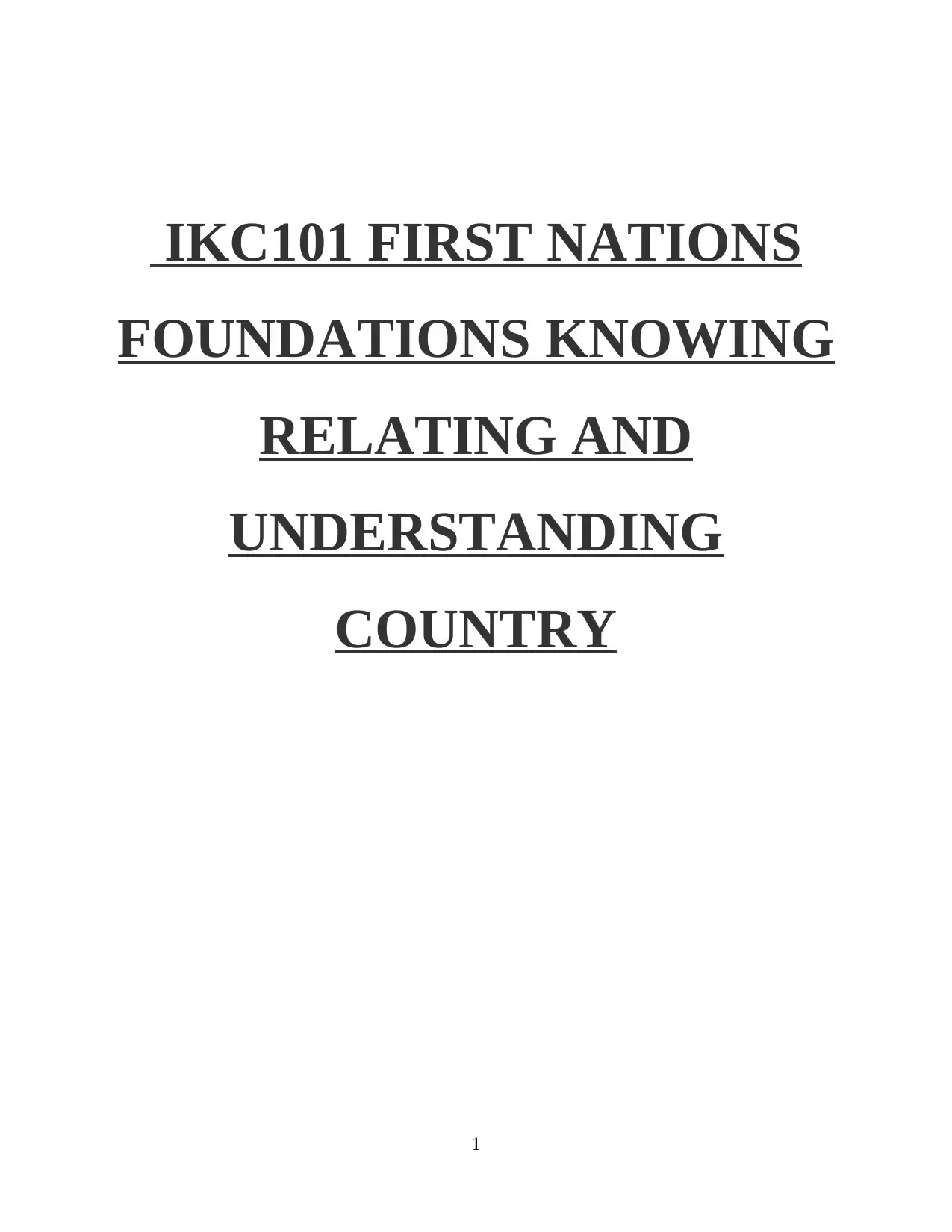
IKC101 FIRST NATIONS
FOUNDATIONS KNOWING
RELATING AND
UNDERSTANDING
COUNTRY
1
FOUNDATIONS KNOWING
RELATING AND
UNDERSTANDING
COUNTRY
1
Paraphrase This Document
Need a fresh take? Get an instant paraphrase of this document with our AI Paraphraser
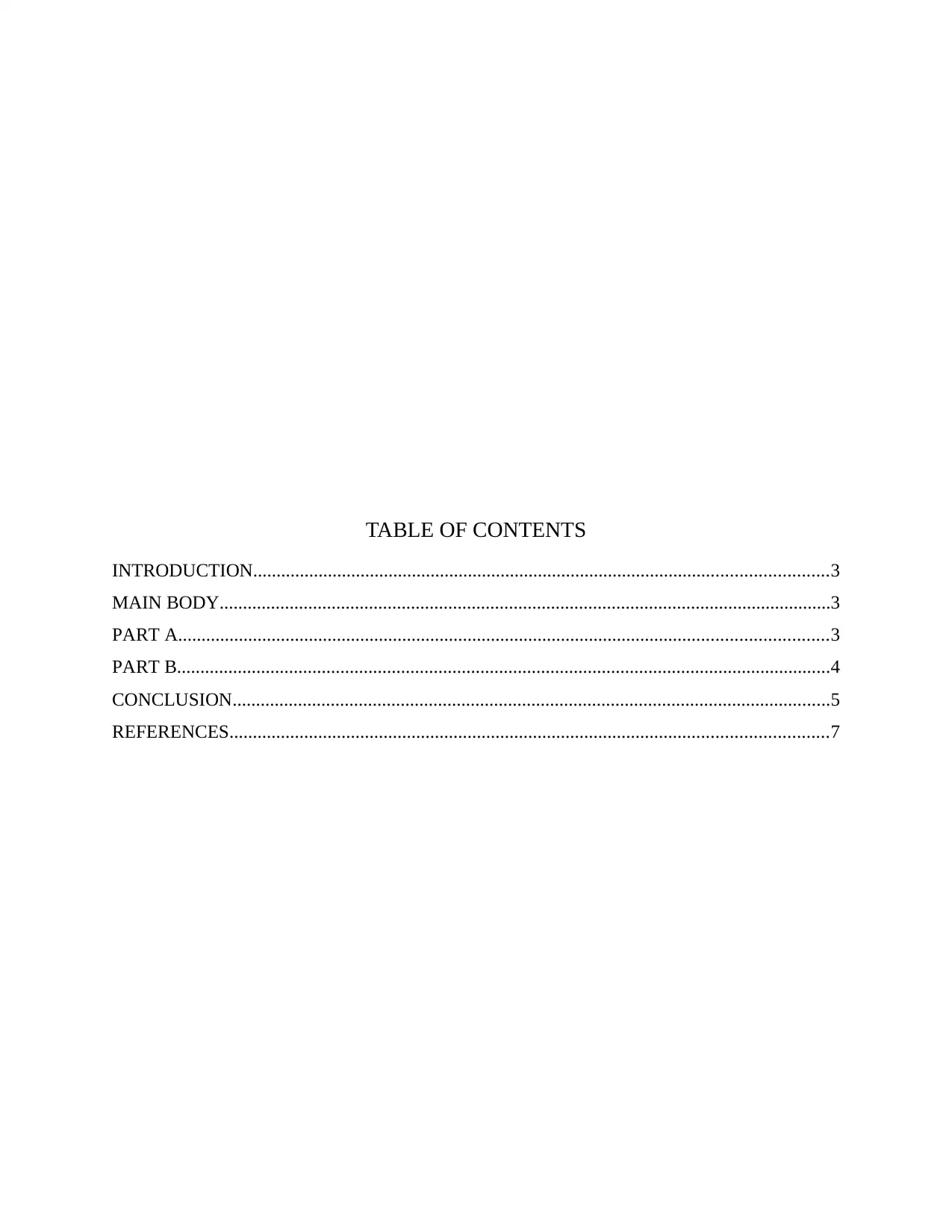
TABLE OF CONTENTS
INTRODUCTION...........................................................................................................................3
MAIN BODY...................................................................................................................................3
PART A...........................................................................................................................................3
PART B............................................................................................................................................4
CONCLUSION................................................................................................................................5
REFERENCES................................................................................................................................7
INTRODUCTION...........................................................................................................................3
MAIN BODY...................................................................................................................................3
PART A...........................................................................................................................................3
PART B............................................................................................................................................4
CONCLUSION................................................................................................................................5
REFERENCES................................................................................................................................7
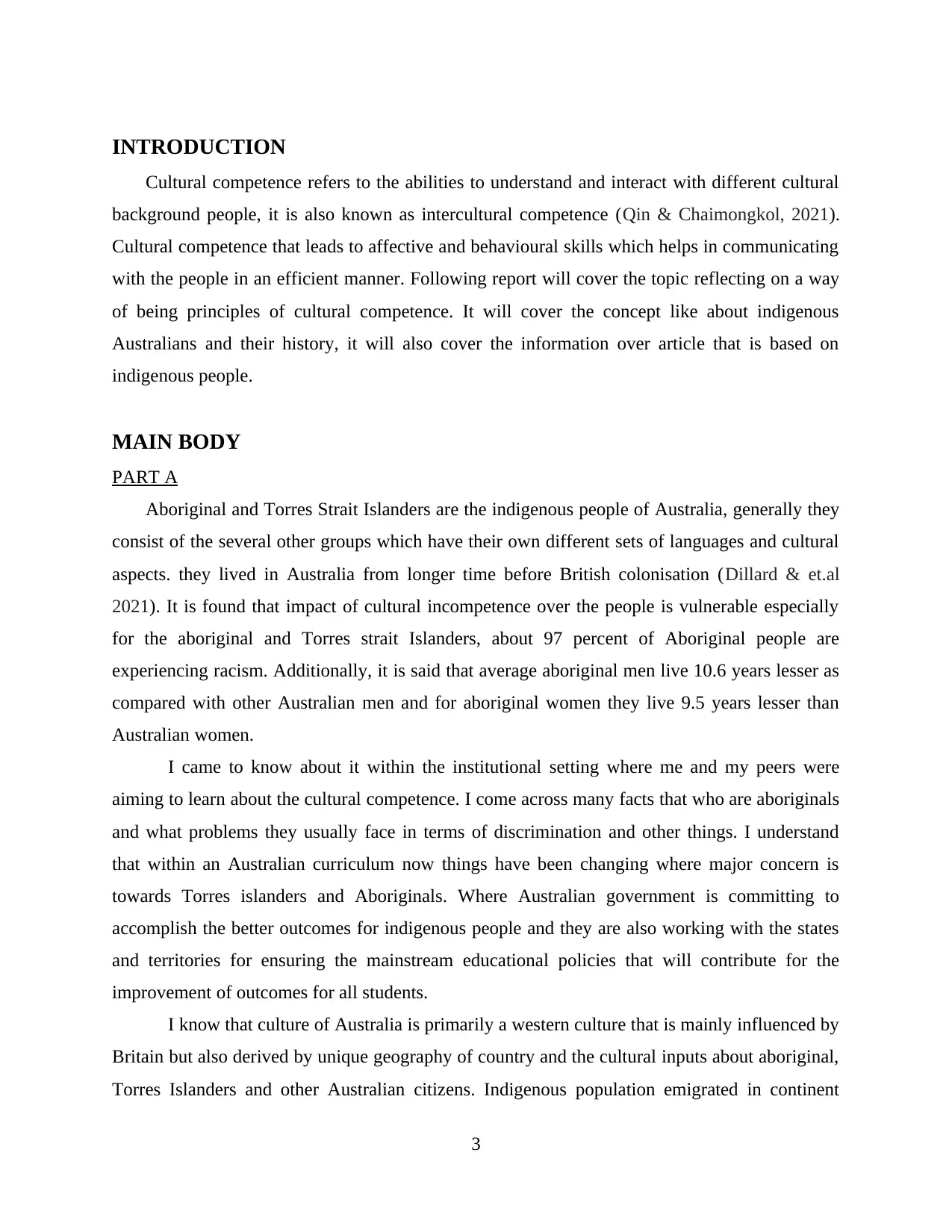
INTRODUCTION
Cultural competence refers to the abilities to understand and interact with different cultural
background people, it is also known as intercultural competence (Qin & Chaimongkol, 2021).
Cultural competence that leads to affective and behavioural skills which helps in communicating
with the people in an efficient manner. Following report will cover the topic reflecting on a way
of being principles of cultural competence. It will cover the concept like about indigenous
Australians and their history, it will also cover the information over article that is based on
indigenous people.
MAIN BODY
PART A
Aboriginal and Torres Strait Islanders are the indigenous people of Australia, generally they
consist of the several other groups which have their own different sets of languages and cultural
aspects. they lived in Australia from longer time before British colonisation (Dillard & et.al
2021). It is found that impact of cultural incompetence over the people is vulnerable especially
for the aboriginal and Torres strait Islanders, about 97 percent of Aboriginal people are
experiencing racism. Additionally, it is said that average aboriginal men live 10.6 years lesser as
compared with other Australian men and for aboriginal women they live 9.5 years lesser than
Australian women.
I came to know about it within the institutional setting where me and my peers were
aiming to learn about the cultural competence. I come across many facts that who are aboriginals
and what problems they usually face in terms of discrimination and other things. I understand
that within an Australian curriculum now things have been changing where major concern is
towards Torres islanders and Aboriginals. Where Australian government is committing to
accomplish the better outcomes for indigenous people and they are also working with the states
and territories for ensuring the mainstream educational policies that will contribute for the
improvement of outcomes for all students.
I know that culture of Australia is primarily a western culture that is mainly influenced by
Britain but also derived by unique geography of country and the cultural inputs about aboriginal,
Torres Islanders and other Australian citizens. Indigenous population emigrated in continent
3
Cultural competence refers to the abilities to understand and interact with different cultural
background people, it is also known as intercultural competence (Qin & Chaimongkol, 2021).
Cultural competence that leads to affective and behavioural skills which helps in communicating
with the people in an efficient manner. Following report will cover the topic reflecting on a way
of being principles of cultural competence. It will cover the concept like about indigenous
Australians and their history, it will also cover the information over article that is based on
indigenous people.
MAIN BODY
PART A
Aboriginal and Torres Strait Islanders are the indigenous people of Australia, generally they
consist of the several other groups which have their own different sets of languages and cultural
aspects. they lived in Australia from longer time before British colonisation (Dillard & et.al
2021). It is found that impact of cultural incompetence over the people is vulnerable especially
for the aboriginal and Torres strait Islanders, about 97 percent of Aboriginal people are
experiencing racism. Additionally, it is said that average aboriginal men live 10.6 years lesser as
compared with other Australian men and for aboriginal women they live 9.5 years lesser than
Australian women.
I came to know about it within the institutional setting where me and my peers were
aiming to learn about the cultural competence. I come across many facts that who are aboriginals
and what problems they usually face in terms of discrimination and other things. I understand
that within an Australian curriculum now things have been changing where major concern is
towards Torres islanders and Aboriginals. Where Australian government is committing to
accomplish the better outcomes for indigenous people and they are also working with the states
and territories for ensuring the mainstream educational policies that will contribute for the
improvement of outcomes for all students.
I know that culture of Australia is primarily a western culture that is mainly influenced by
Britain but also derived by unique geography of country and the cultural inputs about aboriginal,
Torres Islanders and other Australian citizens. Indigenous population emigrated in continent
3
⊘ This is a preview!⊘
Do you want full access?
Subscribe today to unlock all pages.

Trusted by 1+ million students worldwide
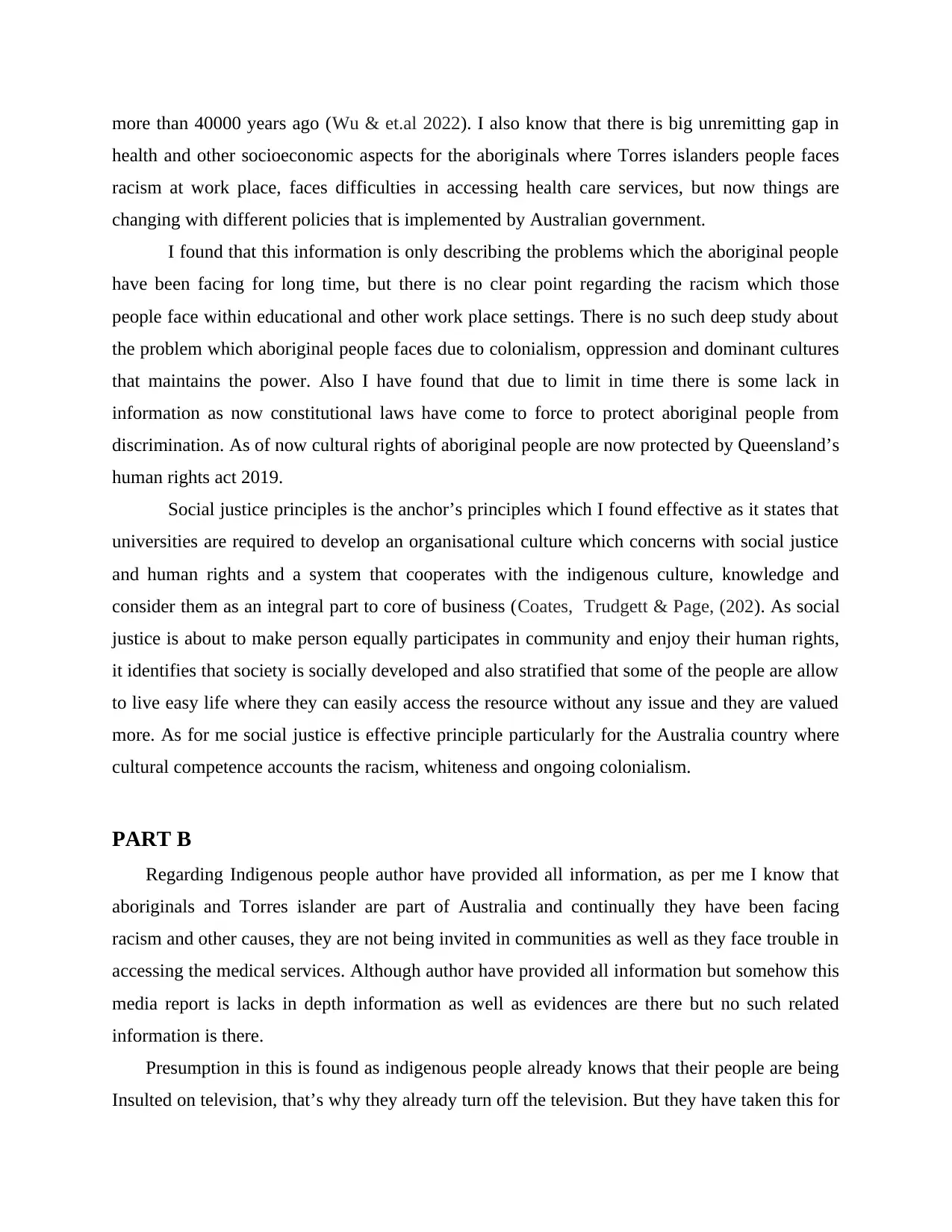
more than 40000 years ago (Wu & et.al 2022). I also know that there is big unremitting gap in
health and other socioeconomic aspects for the aboriginals where Torres islanders people faces
racism at work place, faces difficulties in accessing health care services, but now things are
changing with different policies that is implemented by Australian government.
I found that this information is only describing the problems which the aboriginal people
have been facing for long time, but there is no clear point regarding the racism which those
people face within educational and other work place settings. There is no such deep study about
the problem which aboriginal people faces due to colonialism, oppression and dominant cultures
that maintains the power. Also I have found that due to limit in time there is some lack in
information as now constitutional laws have come to force to protect aboriginal people from
discrimination. As of now cultural rights of aboriginal people are now protected by Queensland’s
human rights act 2019.
Social justice principles is the anchor’s principles which I found effective as it states that
universities are required to develop an organisational culture which concerns with social justice
and human rights and a system that cooperates with the indigenous culture, knowledge and
consider them as an integral part to core of business (Coates, Trudgett & Page, (202). As social
justice is about to make person equally participates in community and enjoy their human rights,
it identifies that society is socially developed and also stratified that some of the people are allow
to live easy life where they can easily access the resource without any issue and they are valued
more. As for me social justice is effective principle particularly for the Australia country where
cultural competence accounts the racism, whiteness and ongoing colonialism.
PART B
Regarding Indigenous people author have provided all information, as per me I know that
aboriginals and Torres islander are part of Australia and continually they have been facing
racism and other causes, they are not being invited in communities as well as they face trouble in
accessing the medical services. Although author have provided all information but somehow this
media report is lacks in depth information as well as evidences are there but no such related
information is there.
Presumption in this is found as indigenous people already knows that their people are being
Insulted on television, that’s why they already turn off the television. But they have taken this for
health and other socioeconomic aspects for the aboriginals where Torres islanders people faces
racism at work place, faces difficulties in accessing health care services, but now things are
changing with different policies that is implemented by Australian government.
I found that this information is only describing the problems which the aboriginal people
have been facing for long time, but there is no clear point regarding the racism which those
people face within educational and other work place settings. There is no such deep study about
the problem which aboriginal people faces due to colonialism, oppression and dominant cultures
that maintains the power. Also I have found that due to limit in time there is some lack in
information as now constitutional laws have come to force to protect aboriginal people from
discrimination. As of now cultural rights of aboriginal people are now protected by Queensland’s
human rights act 2019.
Social justice principles is the anchor’s principles which I found effective as it states that
universities are required to develop an organisational culture which concerns with social justice
and human rights and a system that cooperates with the indigenous culture, knowledge and
consider them as an integral part to core of business (Coates, Trudgett & Page, (202). As social
justice is about to make person equally participates in community and enjoy their human rights,
it identifies that society is socially developed and also stratified that some of the people are allow
to live easy life where they can easily access the resource without any issue and they are valued
more. As for me social justice is effective principle particularly for the Australia country where
cultural competence accounts the racism, whiteness and ongoing colonialism.
PART B
Regarding Indigenous people author have provided all information, as per me I know that
aboriginals and Torres islander are part of Australia and continually they have been facing
racism and other causes, they are not being invited in communities as well as they face trouble in
accessing the medical services. Although author have provided all information but somehow this
media report is lacks in depth information as well as evidences are there but no such related
information is there.
Presumption in this is found as indigenous people already knows that their people are being
Insulted on television, that’s why they already turn off the television. But they have taken this for
Paraphrase This Document
Need a fresh take? Get an instant paraphrase of this document with our AI Paraphraser
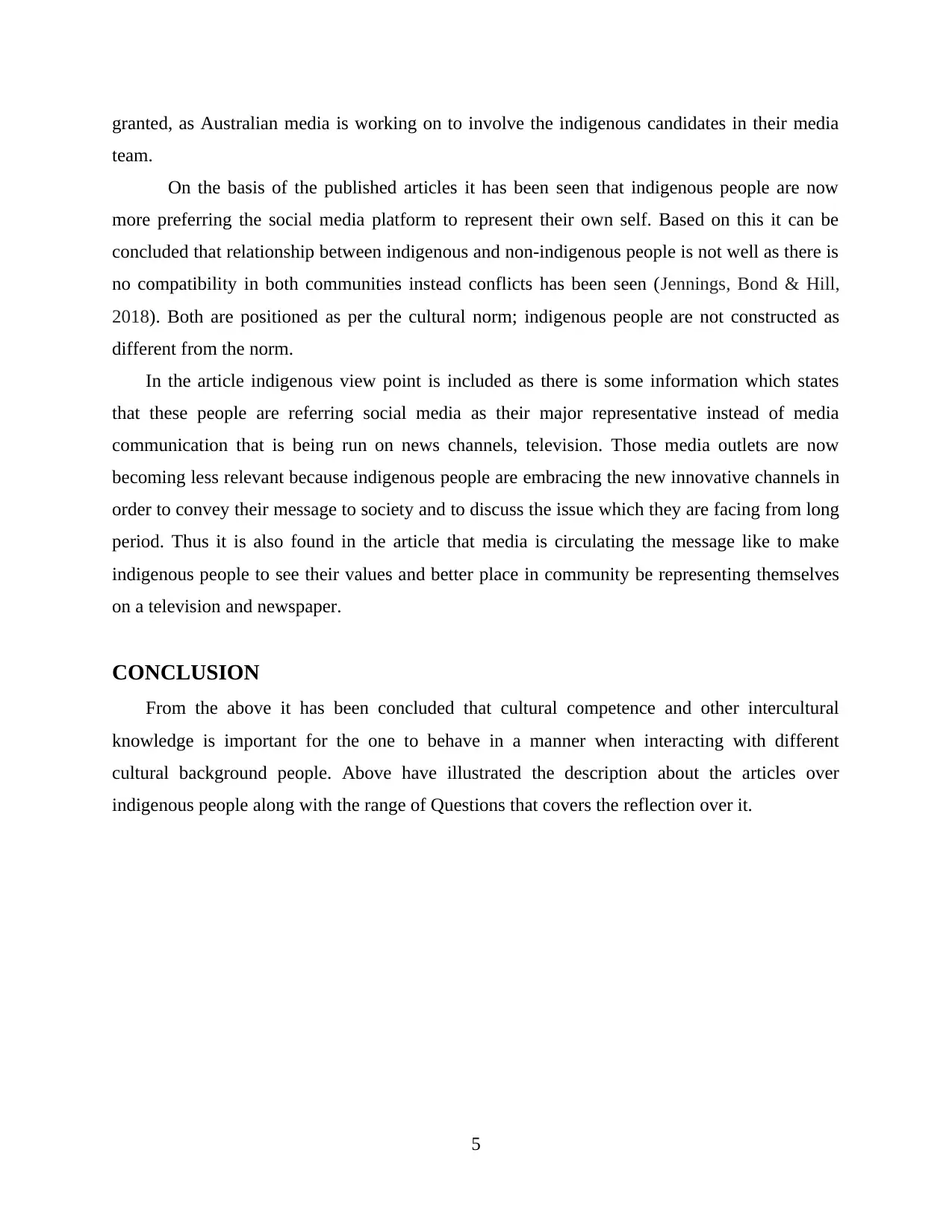
granted, as Australian media is working on to involve the indigenous candidates in their media
team.
On the basis of the published articles it has been seen that indigenous people are now
more preferring the social media platform to represent their own self. Based on this it can be
concluded that relationship between indigenous and non-indigenous people is not well as there is
no compatibility in both communities instead conflicts has been seen (Jennings, Bond & Hill,
2018). Both are positioned as per the cultural norm; indigenous people are not constructed as
different from the norm.
In the article indigenous view point is included as there is some information which states
that these people are referring social media as their major representative instead of media
communication that is being run on news channels, television. Those media outlets are now
becoming less relevant because indigenous people are embracing the new innovative channels in
order to convey their message to society and to discuss the issue which they are facing from long
period. Thus it is also found in the article that media is circulating the message like to make
indigenous people to see their values and better place in community be representing themselves
on a television and newspaper.
CONCLUSION
From the above it has been concluded that cultural competence and other intercultural
knowledge is important for the one to behave in a manner when interacting with different
cultural background people. Above have illustrated the description about the articles over
indigenous people along with the range of Questions that covers the reflection over it.
5
team.
On the basis of the published articles it has been seen that indigenous people are now
more preferring the social media platform to represent their own self. Based on this it can be
concluded that relationship between indigenous and non-indigenous people is not well as there is
no compatibility in both communities instead conflicts has been seen (Jennings, Bond & Hill,
2018). Both are positioned as per the cultural norm; indigenous people are not constructed as
different from the norm.
In the article indigenous view point is included as there is some information which states
that these people are referring social media as their major representative instead of media
communication that is being run on news channels, television. Those media outlets are now
becoming less relevant because indigenous people are embracing the new innovative channels in
order to convey their message to society and to discuss the issue which they are facing from long
period. Thus it is also found in the article that media is circulating the message like to make
indigenous people to see their values and better place in community be representing themselves
on a television and newspaper.
CONCLUSION
From the above it has been concluded that cultural competence and other intercultural
knowledge is important for the one to behave in a manner when interacting with different
cultural background people. Above have illustrated the description about the articles over
indigenous people along with the range of Questions that covers the reflection over it.
5

⊘ This is a preview!⊘
Do you want full access?
Subscribe today to unlock all pages.

Trusted by 1+ million students worldwide
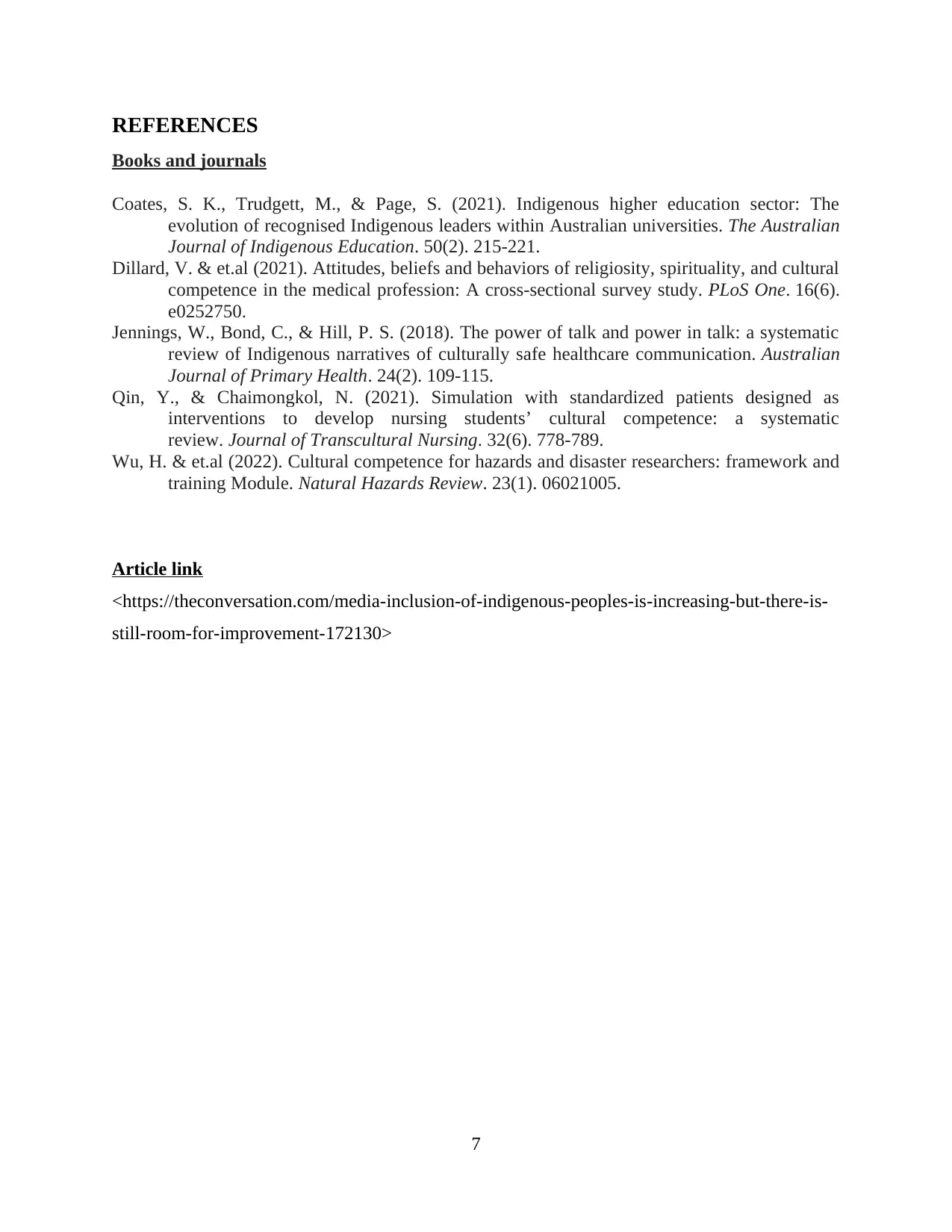
REFERENCES
Books and journals
Coates, S. K., Trudgett, M., & Page, S. (2021). Indigenous higher education sector: The
evolution of recognised Indigenous leaders within Australian universities. The Australian
Journal of Indigenous Education. 50(2). 215-221.
Dillard, V. & et.al (2021). Attitudes, beliefs and behaviors of religiosity, spirituality, and cultural
competence in the medical profession: A cross-sectional survey study. PLoS One. 16(6).
e0252750.
Jennings, W., Bond, C., & Hill, P. S. (2018). The power of talk and power in talk: a systematic
review of Indigenous narratives of culturally safe healthcare communication. Australian
Journal of Primary Health. 24(2). 109-115.
Qin, Y., & Chaimongkol, N. (2021). Simulation with standardized patients designed as
interventions to develop nursing students’ cultural competence: a systematic
review. Journal of Transcultural Nursing. 32(6). 778-789.
Wu, H. & et.al (2022). Cultural competence for hazards and disaster researchers: framework and
training Module. Natural Hazards Review. 23(1). 06021005.
Article link
<https://theconversation.com/media-inclusion-of-indigenous-peoples-is-increasing-but-there-is-
still-room-for-improvement-172130>
7
Books and journals
Coates, S. K., Trudgett, M., & Page, S. (2021). Indigenous higher education sector: The
evolution of recognised Indigenous leaders within Australian universities. The Australian
Journal of Indigenous Education. 50(2). 215-221.
Dillard, V. & et.al (2021). Attitudes, beliefs and behaviors of religiosity, spirituality, and cultural
competence in the medical profession: A cross-sectional survey study. PLoS One. 16(6).
e0252750.
Jennings, W., Bond, C., & Hill, P. S. (2018). The power of talk and power in talk: a systematic
review of Indigenous narratives of culturally safe healthcare communication. Australian
Journal of Primary Health. 24(2). 109-115.
Qin, Y., & Chaimongkol, N. (2021). Simulation with standardized patients designed as
interventions to develop nursing students’ cultural competence: a systematic
review. Journal of Transcultural Nursing. 32(6). 778-789.
Wu, H. & et.al (2022). Cultural competence for hazards and disaster researchers: framework and
training Module. Natural Hazards Review. 23(1). 06021005.
Article link
<https://theconversation.com/media-inclusion-of-indigenous-peoples-is-increasing-but-there-is-
still-room-for-improvement-172130>
7
1 out of 7
Related Documents
Your All-in-One AI-Powered Toolkit for Academic Success.
+13062052269
info@desklib.com
Available 24*7 on WhatsApp / Email
![[object Object]](/_next/static/media/star-bottom.7253800d.svg)
Unlock your academic potential
Copyright © 2020–2026 A2Z Services. All Rights Reserved. Developed and managed by ZUCOL.





